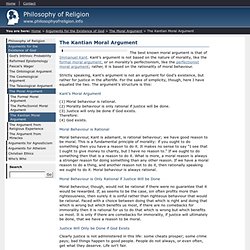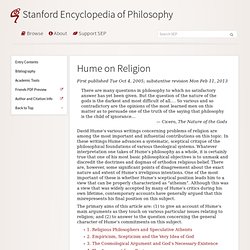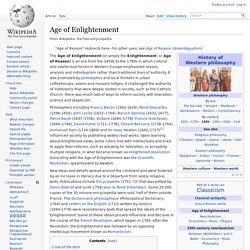

Modern philosophy of religion. Can Religion be Explained Without God? Can Religion Be Explained Without God? Anthology Westphal (A2) - A-Level Ethics & Philosophy at Spalding Grammar School. Immanuel Kant (1724-1804) was the last of the great Enlightenment philosophers and probably the most influential.

He lived his whole life in Königsberg in Prussia, on the coast of the Baltic Sea. Kant produced a vast amount of thought on many topics, but is particularly known for his ideas about morality. For Kant, morality had to be its own reward and anything done for non-moral reasons (like hope of a reward, fear of punishment, etc) was morally compromised. Kant came up with a new formulation for the "Golden Rule", called the CATEGORICAL IMPERATIVE, which is stated as: "Act only according to that maxim whereby you can at the same time will that it should become a universal law" In other words, moral actions are the ones you would wish everyone to do.
The Kantian Moral Argument. The best known moral argument is that of Immanuel Kant.

Kant’s argument is not based on the nature of morality, like the formal moral argument, or on morality’s perfectionism, like the perfectionist moral argument; rather, it is based on the rationality of moral behaviour. Strictly speaking, Kant’s argument is not an argument for God’s existence, but rather for justice in the afterlife. For the sake of simplicity, though, here I have equated the two. The argument’s structure is this: Kant’s Moral Argument (1) Moral behaviour is rational. (2) Morality behaviour is only rational if justice will be done. (3) Justice will only be done if God exists.
Moral Behaviour is Rational Moral behaviour, Kant is adamant, is rational behaviour; we have good reason to be moral. Moral Behaviour is Only Rational if Justice Will be Done Moral behaviour, though, would not be rational if there were no guarantee that it would be rewarded. Justice Will Only be Done if God Exists. Julian Baggini: Hume's attack on 'false' religion catches most of the 'true' sort too. At first sight, Hume's Natural History of Religion looks like a dated combination of armchair history and naïve anthropology.

His dismissal of the polytheism of "barbarous" peoples as more primitive than the monotheism of more advanced ones, for example, seems whiggishly simplistic. Nevertheless, The Natural History retains an interest if you read it as less about history and more about the natural. We have to remember that criticising the religion of the day directly would not have been a wise move. Instead, Hume attacks what he describes as idolatrous and superstitious forms of belief, saying that, of course, the true religion of our place and time is nothing like this. Readers have to spot for themselves that, actually, the differences are not so clear. Hume on Religion. First published Tue Oct 4, 2005; substantive revision Mon Feb 11, 2013 There are many questions in philosophy to which no satisfactory answer has yet been given.

But the question of the nature of the gods is the darkest and most difficult of all…. So various and so contradictory are the opinions of the most learned men on this matter as to persuade one of the truth of the saying that philosophy is the child of ignorance…— Cicero, The Nature of the Gods David Hume's various writings concerning problems of religion are among the most important and influential contributions on this topic. In these writings Hume advances a systematic, sceptical critique of the philosophical foundations of various theological systems. The primary aims of this article are: (1) to give an account of Hume's main arguments as they touch on various particular issues relating to religion; and (2) to answer to the question concerning the general character of Hume's commitments on this subject. 1. 2.
4.3 Responses to religion - The Enlightenment. The Enlightenment (1650–1800) Age of Enlightenment. The Age of Enlightenment (or simply the Enlightenment, or Age of Reason) is an era from the 1650s to the 1780s in which cultural and intellectual forces in Western Europe emphasized reason, analysis and individualism rather than traditional lines of authority.

It was promoted by philosophes and local thinkers in urban coffeehouses, salons and masonic lodges. It challenged the authority of institutions that were deeply rooted in society, such as the Catholic Church; there was much talk of ways to reform society with toleration, science and skepticism. New ideas and beliefs spread around the continent and were fostered by an increase in literacy due to a departure from solely religious texts.
Publications include Encyclopédie (1751–72) that was edited by Denis Diderot and (until 1759) Jean le Rond d'Alembert. Some 25,000 copies of the 35 volume encyclopedia were sold, half of them outside France. Use of the term[edit] If there is something you know, communicate it. Time span[edit]